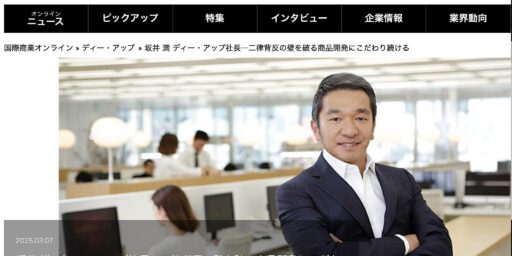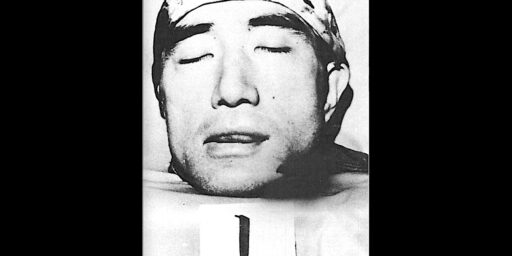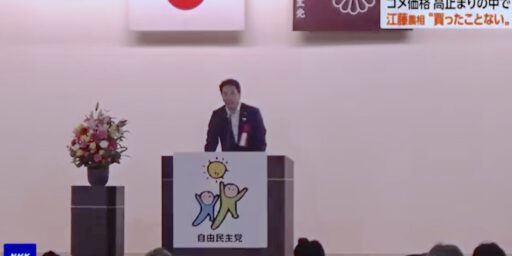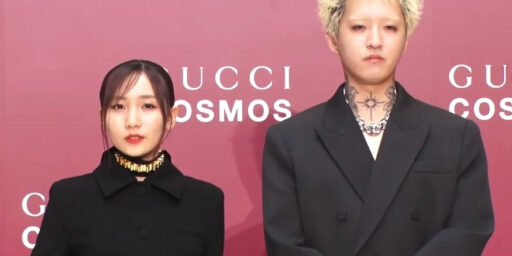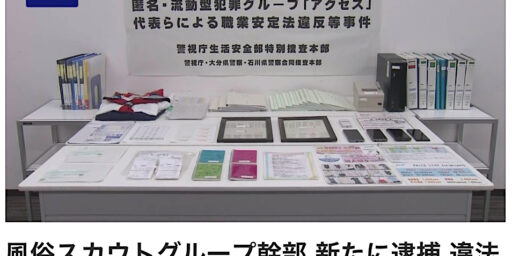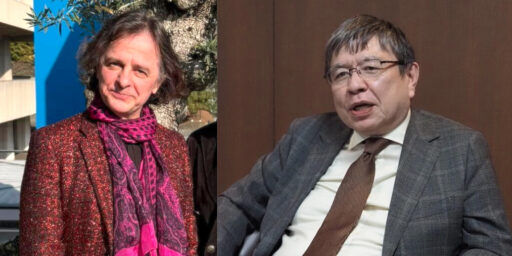Kaiserliche Neujahrszeremonie: Seine Kaiserliche Majestät Kaiser Naruhito “betet für das Glück des japanischen Volkes und die Prosperität des Landes” 新年祝賀の儀 天皇陛下「国民の幸せと国の発展を祈ります」
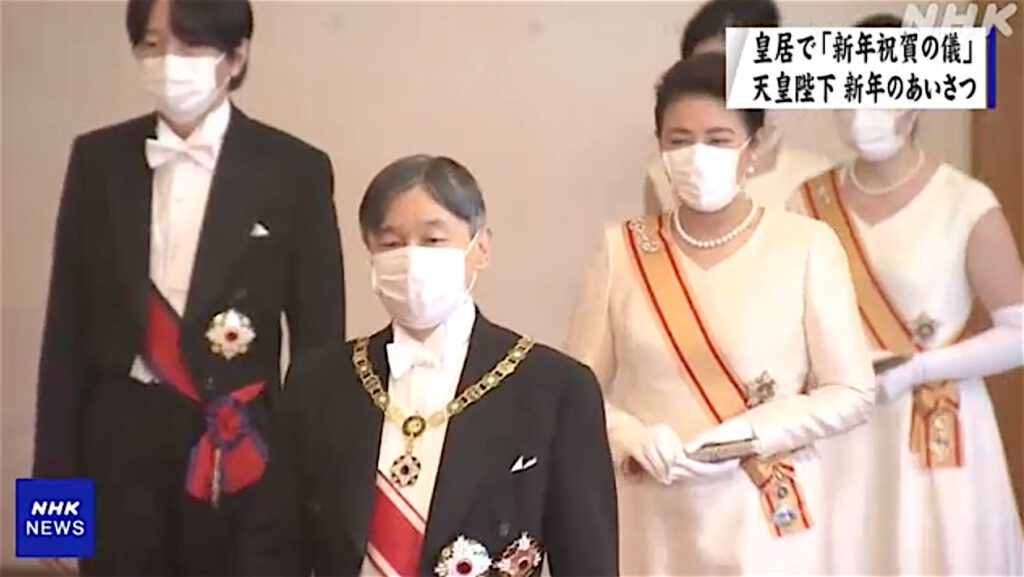
1. Januar 2022, 11:45, Japanisches Kaiserhaus
Heute morgen fand im Kaiserpalast die Neujahrszeremonie statt, bei der Seine Kaiserliche Majestät Kaiser Naruhito die Neujahrsansprache hielt und sagte: “Ich bete für das Glück des Volkes und die Prosperität Unseres Landes.”
Die Neujahrsfeier ist eine Zeremonie zu Beginn des Jahres, bei der der japanische Kaiser zusammen mit der japanischen Kaiserin die Neujahrsgrüße der kaiserlichen Familie, des Premierministers, der Sprecher des Repräsentantenhauses und der in Japan stationierten ausländischen Botschafterinnen und Botschafter entgegennimmt.
Ihre Majestäten, der Kaiser und die Kaiserin, nahmen zusammen mit Prinz Akishino und anderen Mitgliedern der kaiserlichen Familie ab kurz nach 11 Uhr an der Zeremonie im Matsunoma-Saal des Kaiserpalastes teil. Auch die älteste Tochter Ihrer Majestäten, Prinzessin Aiko, nahm an der Zeremonie in ihrer ersten offiziellen Funktion seit ihrer Volljährigkeit im vergangenen Monat teil.
Die Zeremonien wurden unter hygienischen Aspekten durchgeführt, um die Ausbreitung des neuen Coronavirus zu verhindern, und die weiblichen Mitglieder der kaiserlichen Familie verzichteten wie im vergangenen Jahr darauf, ihre Haartiaras zu tragen, da viele Bürgerinnen und Bürger unter der Ausbreitung des Virus zu leiden haben.
Zu Beginn überbrachten der Sprecher des Repräsentantenhauses und der Sprecher des Repräsentantenhauses Neujahrsgrüße im Namen der Mitglieder des Repräsentantenhauses und des Repräsentantenhauses.
Daraufhin sagte Seine Majestät der Kaiser: “Zu Beginn des neuen Jahres bete ich für das Glück der Menschen und die Prosperität Unseres Landes.”
Am Morgen wurden Ihre Majestäten auch von Premierminister Kishida und seinen Ministern begrüßt.
Am Nachmittag wird Seine Majestät Grüße von ausländischen Botschaftern in Japan entgegennehmen und die vorübergehende Residenz des Kaiserpaares in Minato Ward, Tokyo, besuchen.
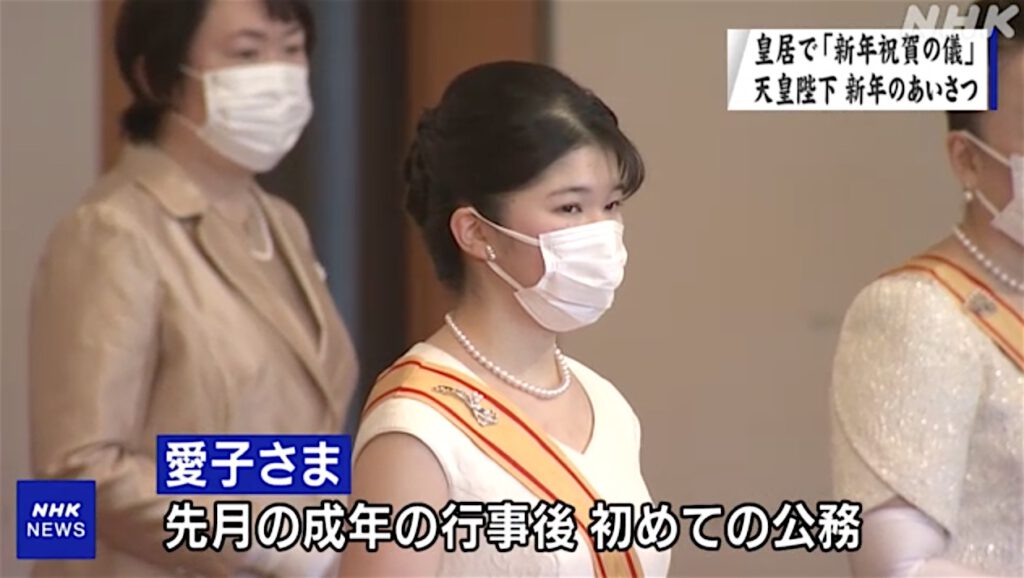
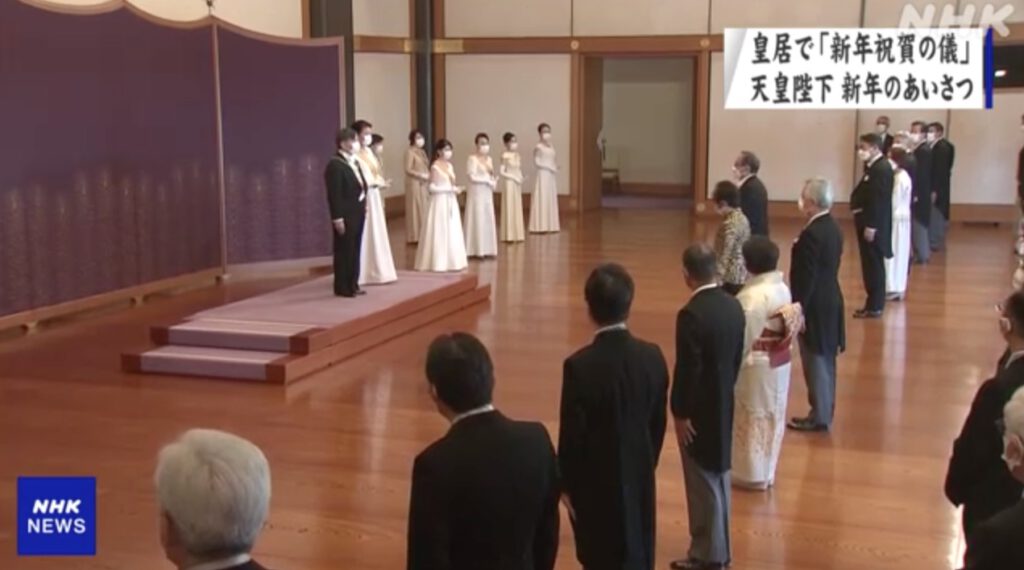
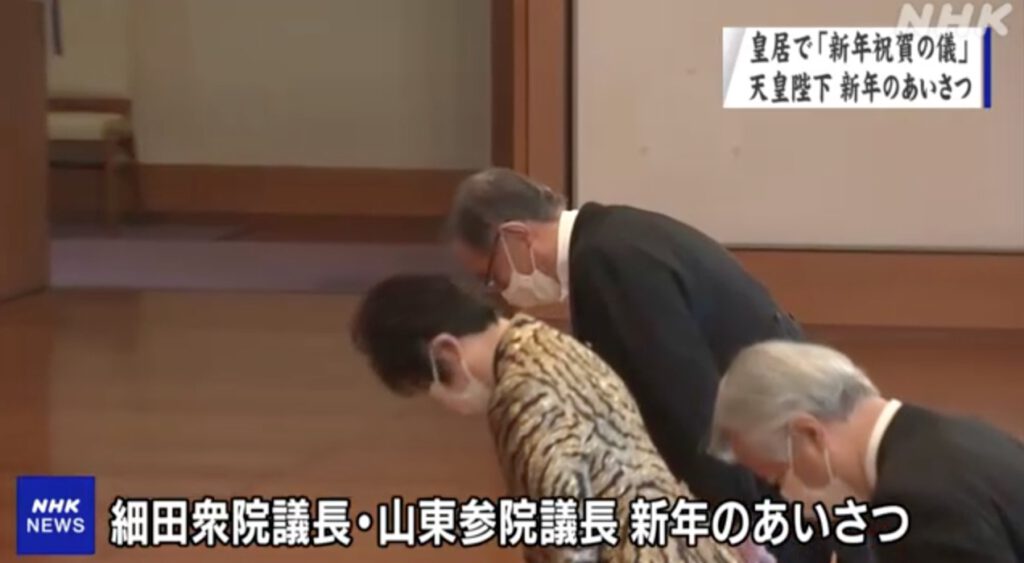
Termine des japanischen Kaisers am Neujahrstag.
Siehe:
https://www.kunaicho.go.jp/news/gyouziitiran-r040101.html
午前 5:30 天皇陛下 四方拝の儀 神嘉殿
同 5:40 天皇陛下 歳旦祭の儀 宮中三殿
同 9:30 天皇陛下 晴の御膳 花の間
同 9:45 両陛下 祝賀 長官,次長(総代),皇宮警察本部長(総代)及び参与等 鳳凰の間
同 10:00 両陛下 祝賀の儀 皇嗣お始め皇族各殿下 松の間
同 10:10 両陛下 祝賀 元皇族(代表),御親族(代表) 竹の間
同 10:15 両陛下 祝賀 未成年皇族 鳳凰の間
同 11:00 両陛下
お始め 祝賀の儀 内閣総理大臣等 梅の間
次いで 衆議院議長及び参議院議長等 松の間
次いで 最高裁判所長官等 竹の間
正午 両陛下
お始め 祝賀の儀 各国の外交使節団の長 松の間
午後 両陛下 祝賀 堂上会総代 鳳凰の間
午後 両陛下 愛子内親王殿下 祝賀 上皇上皇后両陛下 仙洞仮御所
午後 両陛下 愛子内親王殿下 祝賀 侍従職職員 御所
up-date: 2022/2/22
Mental health issues show women bear brunt of Japan monarchy system
The diagnosis of former princess Mako’s post-traumatic stress disorder prior to her controversial marriage in October has once again highlighted the intense pressure that women in the Japanese imperial family face, with some other members also plagued by mental health issues.
The former princess, 30, who is a niece of Emperor Naruhito, came under massive public scrutiny after it became known that the family of her commoner husband Kei Komuro was involved in a financial dispute.
Her aunt Empress Masako, 58, has long been battling a stress-induced illness related to the pressure she was under to produce a male heir, while former Empress Michiko, 87, the emperor’s mother, became unable to speak for months amid bashing by weekly magazines following her husband’s accession to the throne in 1989.
Both the empress and the former empress were commoners before their marriages to then crown princes.
Under Japan’s 1947 Imperial House Law, women are not eligible to ascend the throne and female members of the imperial family leave the household upon marrying a commoner.
While the former princess and Komuro eventually married on Oct. 26, more than four years after their relationship was made public, traditional ceremonies associated with a royal marriage were not held due to public unease over the money row.
“It is as if there are no human rights (within the imperial family),” said clinical psychologist Sayoko Nobuta.
The Imperial Household Agency revealed prior to the marriage that the former princess had been diagnosed with complex PTSD caused by what she described as psychological abuse the couple and their families received.
Regarding his daughter’s mental health, Crown Prince Fumihito, the emperor’s brother, stressed on the occasion of his 56th birthday in November the need to establish “criteria to refute” erroneous reports.
While the agency has exposed fake news in the past, debunking some reports on its website since 2007, it does not have a clear policy on how to handle such matters.
“Even if (former princess Mako) was told to ignore or not engage with online bashing, one can’t help but notice it in their daily life, and it will chip away at one’s heart before they know it,” said Rika Kayama, a psychiatrist and commentator on social issues.
The former princess’ case is just the latest in a history of mental issues that have befallen women in the imperial family.
In 2004, the agency announced that Empress Masako, then the crown princess, had been diagnosed with adjustment disorder after giving birth in 2001 to Princess Aiko, the only child between her and the emperor. The empress had canceled her official duties the previous year following a bout of shingles.
The empress, a Harvard- and Oxford-educated former diplomat, gave up her career to enter the imperial family in 1993 after accepting a marriage proposal by the then crown prince, having initially declined the offer.
Many speculated that a major cause of her stress was pressure to produce a male heir, as no boys had been born to the imperial family since the birth in 1965 of Crown Prince Fumihito.
The situation abated after Crown Princess Kiko gave birth in 2006 to Prince Hisahito, 15, who is now second in line to the throne.
But unlike former Emperor Akihito and former Empress Michiko, who usually engaged with the public as a couple, the current emperor often performs official duties on his own due to his wife’s condition, although she has been gradually expanding the scope of her activities in recent years.
Still, even the former empress, who became the first commoner to wed an heir to the imperial throne in 1959, was not immune to the pressures of the imperial family.
After the former emperor’s accession to the throne in January 1989, she became the focus of a backlash in weekly magazines triggered by his cultivation of a more approachable image compared to his father Emperor Hirohito, who had taken the throne before World War II when emperors were still regarded as living gods.
On the day of her 59th birthday in October 1993, the former empress collapsed and lost her voice due to psychogenic aphasia.
“The emperor is the symbol of Japan, and the monarchy is a symbol of patriarchy. Therefore, discrimination against women is most pronounced in the imperial family,” Nobuta said, adding that such an environment makes it difficult for bright women to survive.
Nobuta said that former princess Mako, who grew up watching these events and had studied at International Christian University in Tokyo as well as in Britain, must have felt the only way to truly live her life was to leave Japan.
“For former princess Mako, escaping was her main goal, and I think she chose Komuro as the man who could help her achieve this goal,” Nobuta said.
The couple left Japan shortly after registering their marriage to start a new life in New York, where Komuro works as a law clerk at a legal firm.
All eyes are now on Princess Aiko, who turned 20 in December and is now expected to perform official duties as an adult member of the imperial family.
The princess would be entitled to the throne if she were a member of the British or Dutch monarchy, both of which allow the eldest child of the monarch to succeed regardless of gender.
A government panel tasked with studying ways to ensure a stable imperial succession proposed on Dec. 22 allowing female members who marry commoners to retain their imperial status.
But it postponed drawing conclusions regarding whether women or imperial members in the matrilineal line will be eligible to ascend the throne.
In the past, Princess Aiko has sparked concerns and speculation among the public for her prolonged absence from school and a sharp weight loss at one point, but it remains to be seen if the mental health issues that befell the female relatives before her will repeat themselves.
Hajime Sebata, an associate professor of modern Japanese history at Ryukoku University, said that building rapport with citizens through communication, not counterarguments, is key.
“If (the agency) regularly posts (information on royals) on social media and communicates, the public will come to trust the imperial family even if there are criticisms,” he said.

-512x256.jpg)
